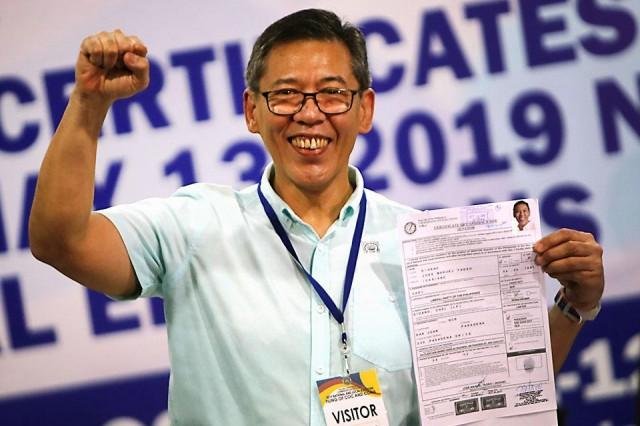The Good and Brilliant Ka Pepe Diokno
/Senator Jose Diokno (Source: Alchetron)
This reflection was delivered by the author on February 26, 2022 during the virtual mass sponsored by the Women Writers in Media Now (WOMEN), officiated by Fr. Albert Alejo from Rome. It was the 243rd mass celebrated to commemorate the 100th birth anniversary of Senator Jose W. Diokno.
To which he answered: "And so the law in the land died. I grieve for it but I do not despair over it. I know, with a certainty no argument can turn, no wind can shake, that from its dust will rise a new and better law: more just, more human and more humane. When that will happen, I know not. That it will happen, I know."
And so it happened that the senator was made to disappear in '73—transferred in the night from his prison cell, blindfolded and manacled, to an unnamed site, and kept incommunicado from family for more than a month. Getting out of prison, what would he do? Organize FLAG. This organization would then—and now—give free legal aid to both highborn and poor, whose rights—whose very existence sometimes—had been violated.
It was the law he had turned to once again. He never gave up on it. Not even when Marcos did away with the Constitution and replaced it with one more to his peculiar taste, upending the fundamental manuscript that lawyers, like Ka Pepe, had built their whole system of beliefs on. Not even when Marcos reorganized the entire judiciary in 1980, emasculating an entire third branch of government and subsuming it under his executive powers. And not even when Ka Pepe's clients, as was the case with Sixto Carlos Jr., had to drop him as counsel in exchange for which his captors would allow visits from his wife and children.
Ka Pepe plodded on—commissioning logic and reason, drafting argument and erudition, mobilizing research and speech, even tapping emotional intelligence. All the tools built on a deep knowledge of laws, courts, and judges. His son, Chel Diokno, putting together the first of what promises to be several volumes called The Model Pleadings of Jose W. Diokno, cites some of his father's defiant efforts.
Senator Diokno’s son, lawyer Jose Manuel “Chel” Diokno, seeks to emulate his father's public service and is running for senator in the May 2022 elections. (Source: GMANews)
In one, Ka Pepe rebuts a contempt of court charge against his client, Aquilino Pimentel, saying clearly and simply: "If it is not contempt of court for the President and the military to express belief in Mayor Pimentel's guilt, how can it be contempt of court for Mayor Pimentel's supporters to express their belief in his innocence?"
In another, defending Jose P. Laurel and Claro M. Recto, then charged with being communist sympathizers because they were counsel in a case, Ka Pepe wrote more stridently. He told Justice Secretary Oscar Castelo that the charges he threatened to bring up were "manifestly false and absurd charges" and existed "to satisfy his lust for vengeance," because the man "has been for the time past, preparing perjured and manufactured evidence, consisting of affidavits extorted by intimidation or promises of reward..."
And then came the case of Father Rudy Romano, Redemptorist priest, abducted in Cebu and never seen again. He was 44 years old. Ka Pepe's pleadings show how, brick by brick, he demolishes claims that military intelligence did not have the priest in its custody. Purportedly, the military establishment was cooperating, Enrile and Co. over at Defense were cooperating, and all were busy looking for the missing priest. One day, an agitated Father Hechanova informs Brigadier General Ecarma that they have word Father Rudy is in the hands of the 7th MIG. So, the priest prods the general, Why not inspect the 7th MIG unannounced? Then, as Ka Pepe writes: "Brig. Gen. Ecarma refused on the lamest of excuses: that the 7th MIG compound has 'high stone walls.'" Truly lame, because 7th MIG was housed in the very camp commanded by the brigadier general.
Ka Pepe just kept going. In the legal arena, he met with the nonsensical, with the laughable, with the poor excuses for human beings, but he stuck to doing well by his clients, to over-preparing for his trials. Chel says that his father's notes include admonitions like: There are two sides to every lawsuit. A lawyer who knows his or her own case only is half prepared... And this: Logic is only one facet of advocacy. Do not overlook relevant facts which create sympathy for or interest in your client.
“And so it happened that the senator was made to disappear in ‘73—transferred in the night from his prison cell, blindfolded and manacled, to an unnamed site, and kept incommunicado from family for more than a month.”
I have to admit. I do not always get it. What is with Ka Pepe's stubbornness? Does he not see the futility here? His pleadings have this effect on me: His lawyer's oratory, his singular preparations, his intelligence—what are these in the face of a compromised bench? Where does it all go when judges are political appointees? Under martial rule, are not the justices just as intimidated as the lowly petitioners and respondents?
But, as I so often also think: Lawyers are probably the best defenders of our democracy. If it were not for them and their stubbornness, if it were not for their unwavering belief system—we probably would all be outlaws! To go by one lawyer's words: "I know, with a certainty no argument can turn, no wind can shake..."
With Senator Jose W. Diokno, I always stop to take in the brilliance. The mind behind these pleadings, put forth before men and women similarly schooled and nurtured, similarly exalted as thinkers, as judges, as solons—that mind had to be superior to so many in the same room. It had to be, to command the kind of respect and reverence that can bring us together today, his 100th year.
Today, it would be such a joy to be surrounded by that language, by those thoughts, to have the air ring with sounds that elevate heart and sensibility, and give us reason to think God is not asleep. In the end, though, I would like to go beyond Ka Pepe's brilliance. I would like to go with something more precious: his goodness. I think that is what God would like, too.
Jo-Ann Q. Maglipon started her journalism career in 1972, the year Ferdinand Marcos declared martial law. After joining the Underground and going to prison, she returned to the trade, where she remains today, as editor and author.
More from Jo-Ann Maglipon





